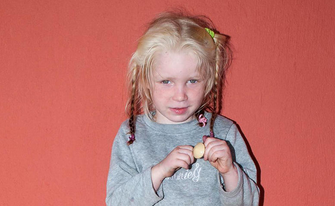Published: 29 October
Country: UK and Europe

The ancient fear of kids kidnapped by Roma people is taking flight across Europe, with an alarming media’s connivance in spreading old stereotypes.
This comes after a week when three Roma families – one in Greece and two in Ireland – have had their children taken away with accusations of child abduction. Allegations were merely based on the contrast between the children’s fair hair and pale skin with parents’ dark complexion.In both Irish cases, authorities’ claims proved unfounded. In Greece, DNA testing has shown the blonde little girl was not related to her parents. Her biological family was a Bulgarian couple. They voluntary left their baby with the Greek family before going back to Bulgaria four years ago. The child was not abducted.
Following this media hysteria about Romani people snatching blonde children, last week the BBC World Service dedicated an hour programme to the issue. From a Roma caravan site in Surrey, home of Anne and Michael Wilson, some Romani community members gathered around the microphones of World Have Your Say. Jake Bowers, English Romani journalist and MDI consultant, presented Roma Have Your Say. His guests conversed on their reactions to the news and its media coverage, as well as how false myths against Roma people clash with the traditions they are proud of.
“When I saw the news of law enforcement, taking fair hair children into care I was very concerned because my daughters are blond,” said Anne Wilson. “Is this coming to England? Will I have my children tested? These things escalate so quickly.”
From old nursery rhymes reciting “My mother said I never should play with Gypsies in the wood” to the modern witch hunts against fair-haired children’s families, child stealing is a false myth whose origins are lost in the midst of time.
“Romanies are like all the other people, some are good, and some are not. But stealing a kid is something that nobody would ever do.” said Romani reverend Tom Wilson. “The problem – the 70-year-old man continued – is that media don’t give good news about Roma people. Anything good is put to one side.”
Media are responsible for an unfair representation of Roma people and play a significant role in creating misconceptions among society. The word “angel”, used by media to name the little blond girl in Greece, inevitably creates a stark polarity with the Roma community she was with, implicitly suggesting a negative connotation. “They said that this child had to be rescued, as we are not suitable for raising children,” pointed out Mrs Wilson.
Another Romani man, named as George, was unimpressed by media coverage of the last three cases: “What you see and what is said in the media is very different. You see camps and a lot of poverty but this is not said.” News stories just revolve around the allegation of child abduction with no contextualisation at all. “No one mentioned all the other Romani children that went missing, or those who have been snatched, put into institutions and disappeared,” added his wife Susan. “Who is worried about them? Nobody seems to be.”
The violation of Roma human rights goes far beyond taking into custody Roma children. The biggest minority in the European Union has been subjected to abuses such as the exclusion from some public schools, forced evictions, and hate crimes. Going back to 19th century, Romani women in Czech Republic and Slovakia faced forced sterilised, and hundreds of thousands of Roma people were killed in the gas chambers by the Nazi and shot all across Europe.
Nobody, including members of the Roma community, denies that there are issues that need to be addressed, but these have to be contextualised in the frame of a deep-rooted discrimination that leads them to live in poverty at the margin of society.
“I refuse to talk about it (the conflicts between Roma and other communities, editor’s note) without explicitly referencing the history which, in the case of a country like Romania, includes 500 years of Romas being brutalised, enslaved, raped,” said Damian LeBas, Romani editor of Travellers Magazine and graduate of Oxford University. “The world has to wake up in that if we have to address the issues in our community.”
